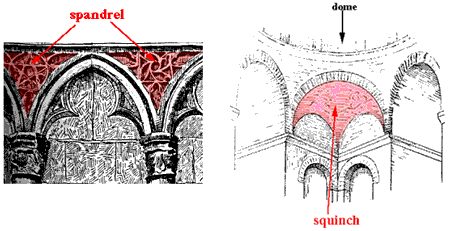While reading an interesting post on Babel’s Dawn today, I came across the word spandrel. I have heard it before but wasn’t entirely sure what it meant.
According to Wikipedia, a spandrel is “the space between two arches or between an arch and a rectangular enclosure”. The word spandrel is also used in the theory of evolution to describe a non-adaptive trait formed as a side effect to an adaptive one, which the context in which it was used on Babel’s Dawn.
The information about spandrels also mentions a related architectural term: squinch, which is a “piece of construction used for filling in the upper angles of a square room so as to form a proper base to receive an octagonal or spherical dome”.
Another definition tells us that a squinch is an arch, or a system of concentrically wider and gradually projecting arches, placed at the corners of a square base to act as the transition to a circular dome placed on the base.
The etymology of spandrel is somewhat uncertain, but it’s thought to come from the Latin word expandre, to expand, via the French espandre, to expand, extend.
Squinch is an alternative form of scuncheon, from the Middle English sconchon, from the Old French escoinson, from the Latin ex, out, plus cuneus, wedge.
Here’s an illustration to help you tell the difference between spandrels and squinches.


